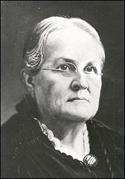Hobbs, Mary Mendenhall
By Treva W. Mathis, 1988
30 Aug. 1852–20 July 1930
Mary Mendenhall Hobbs, educator, writer, and speaker, was born at Florence, near Jamestown, to Nereus and Oriana Wilson Mendenhall. She was tutored by her father, an  outstanding teacher, attended village schools and New Garden Boarding School, and was graduated from Miss Howland's School on Lake Cayuga, Union Springs, N.Y. After graduation she taught at Howland for a year, then returned home to teach Latin and history for two years at New Garden Boarding School. The principal was young Lewis Lyndon Hobbs, whom Mary had known since childhood. They were married in 1880. Their strong Quaker background, their beliefs in good educational opportunities for male and female alike, and their own excellent education formed the basis for a long, happy, and very compatible union. They were the parents of five children: Walter, Lewis Lyndon, Jr., Allan Wilson, Richard J. M., and Gertrude.
outstanding teacher, attended village schools and New Garden Boarding School, and was graduated from Miss Howland's School on Lake Cayuga, Union Springs, N.Y. After graduation she taught at Howland for a year, then returned home to teach Latin and history for two years at New Garden Boarding School. The principal was young Lewis Lyndon Hobbs, whom Mary had known since childhood. They were married in 1880. Their strong Quaker background, their beliefs in good educational opportunities for male and female alike, and their own excellent education formed the basis for a long, happy, and very compatible union. They were the parents of five children: Walter, Lewis Lyndon, Jr., Allan Wilson, Richard J. M., and Gertrude.
As early as her student days at Howland, Mary's interest in the education of young ladies was apparent. When asked to write an essay on what she would do if given $10,000 to spend as she wished, she said that she would establish a school for girls. Later, while serving as assistant clerk of the 1889 North Carolina Yearly Meeting, she was moved to ask the women's meeting for subscriptions to help educate Quaker girls. They responded with contributions of $103. Heartened by this success, she summoned her courage to appear before the men's meeting to ask for money. It was "an unlooked for, inexplicable thing to do." Nevertheless, they, too, responded generously and, as a result, the Girls Aid Committee of the Yearly Meeting was formed. Mrs. Hobbs intended that the girls live in cottages and save expenses by supplying much of their food and doing all the cooking, cleaning, and so forth. The plan was so successful that soon a dormitory was built. It was called New Garden Hall, but in later years was renamed Mary Hobbs Hall.
Mary Hobbs's interest in education was not limited to Quaker girls. She envisioned better opportunities for all girls and worked hard for the cause. She was asked to speak often—on many topics—and did, but always requested additional time to give her views on the unpopular subject of education for girls. She wrote petitions to the legislature for various women's organizations, but gave them to Charles Duncan McIver to present when she learned that he also was interested in the education of women. She appeared before the education committee of the General Assembly to plead for an appropriation for the founding of a "normal and industrial school for white girls," and it was her earnestness that helped persuade the legislature to establish the school now known as The University of North Carolina at Greensboro. In recognition of her work for higher education, The University of North Carolina awarded her the honorary doctor of literature degree in 1921.
While continuing to write and speak for women's education, she also used her expressive voice and pen in many other causes—among them temperance, woman suffrage, home missions, capital punishment, Indian affairs, orphanages, and the League of Nations. She remained active in the affairs of the Yearly Meeting, serving on a long list of committees and organizations. With all her activities, she never neglected her family and home life. Arcadia, the family home near the Guilford College campus, was the center of warm, friendly hospitality to students, faculty, and community. Mrs. Hobbs mothered neighborhood boys and girls as well as her own, and arranged for many of them to attend New Garden Boarding School by paying their expenses from her own funds.
References:
Frances Renfrow Doak, Mary Mendenhall Hobbs (lecture delivered at Guilford College on Founders Day, 1955)
Mary Mendenhall Hobbs, "History of New Garden as Written by Mrs. Mary Hobbs," Guilfordian (1920)
Carol Inglis, "Mary Mendenhall Hobbs" (paper written at Guilford College, 1976)
"Mary Mendenhall Hobbs," Greensboro Daily News , 21 July 1930
New Garden Monthly Meeting, "Memorial for Dr. Mary Mendenhall Hobbs" (read in a memorial service, 17 July 1932)
Lynda S. Swofford, "A Long Ago Vision . . . A Force Today," Greensboro Daily News , 14 May 1972
Additional Resources:
Bubar, Mary. "Friends Center Series revisits the life of Mary Hobbs." The Guilfordian. Guilford College. April 17, 2009. http://www.guilfordian.com/archives/2009/04/17/friends-center-series-revisits-the-life-of-mary-hobbs/ (accessed May 14, 2013).
Image Credit:
"Mary Mendenhall Hobbs," Photo courtesy of the Jamestown News. Available from # (accessed April 19, 2012).
1 January 1988 | Mathis, Treva W.